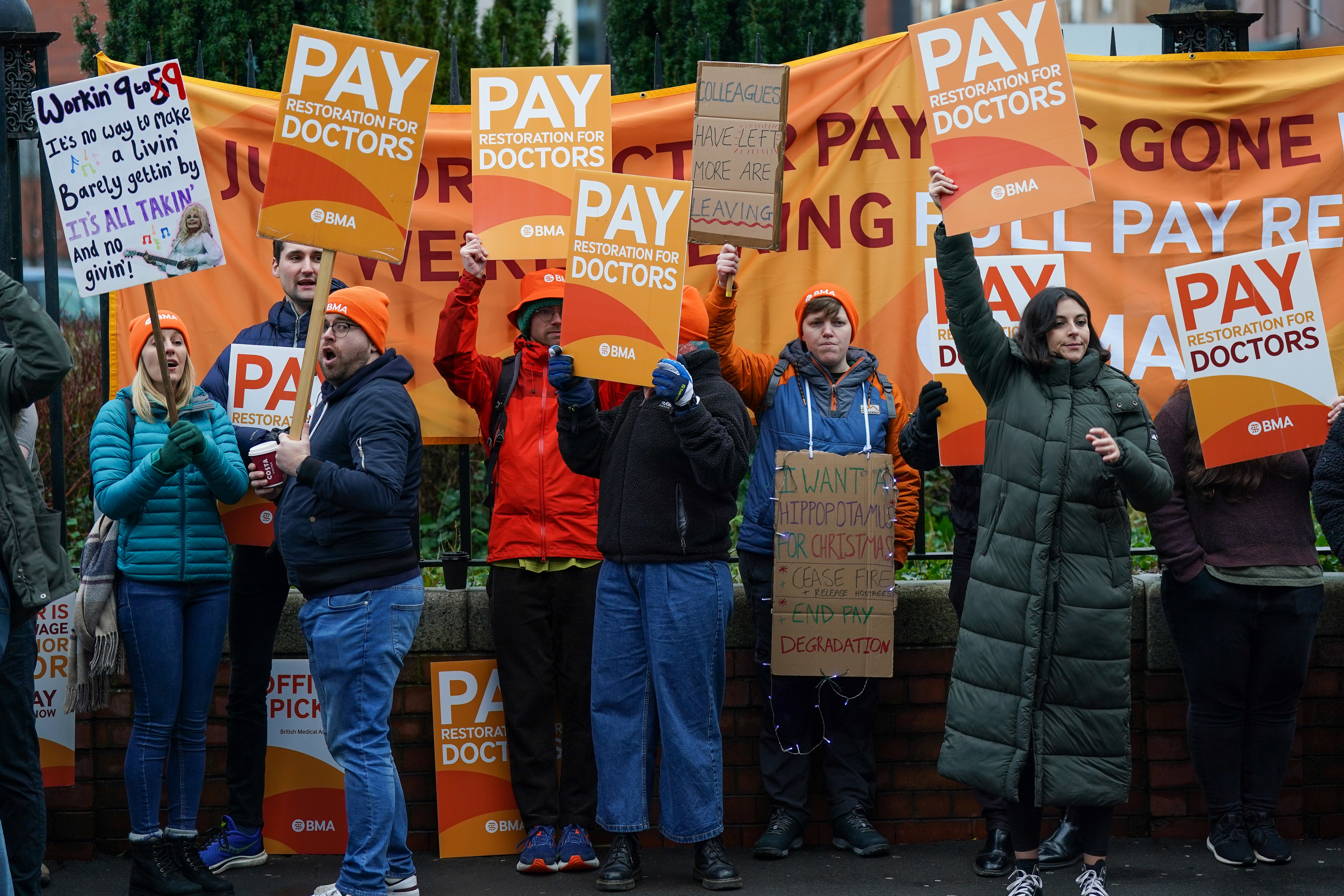The last thing the Sunak administration needs is a month of NHS discontent
Editorial: The health secretary Victoria Atkins needs to take the initiative with the BMA and start to win the arguments, before the health of the government deteriorates further

More than any other industrial dispute, the strike by junior doctors carries with it a heavy moral burden.
There can be no doubt that every medic who takes part in what is to be the longest strike of its kind in the history of the NHS will be troubled by the consequences for patients. After all, the majority took a solemn oath to protect those they care for on entering the profession.
This is, then, no ordinary strike. With the best will in the world, and with agreements in place with the hospital trusts to preserve life and limb in extremis, there will still plainly be a detriment to patients with painful and distressing conditions – postponed operations and delays to see a qualified physician in A&E, for example.
It is foolish to pretend that a six-day-long strike by so many doctors will not cause some harm, even if the sincere aim is to prevent worse long-term damage to the health service through chronically understaffed wards and clinics: the axiom in medicine is surely that the sooner something is attended to the better.
For the moment, the doctors seem to have kept the support of the public for their broad cause, if not the detail of their 35 per cent pay demand, something that few, even among those striking, think is a realistic prospect. (It is worth mentioning in that context, in this election year, that neither the Labour Party nor the Liberal Democrats would concede such a demand.)
The doctors argue that this large rise merely demonstrates how grievous has been the decline in the purchasing power of their salaries compared to the level prevailing in 2008. There is merit in that argument but no economy and no trade can operate on the basis of immutable given levels of pay for a particular job.
The real question is what the going rate for a junior doctor should be, given market conditions and the unusually heavy demands – in time and emotional energy – made on them during this stage in their careers. It is a mixture of market forces, tempered by fairness.
On those grounds, the doctors have a pretty strong case – and ministers must realise that. The reality is that too many doctors are either migrating or giving up because they find their pay insufficient to match the cost of living and the stress of the job, let alone whatever expectations they may have.
The exodus from the NHS can be exaggerated but, according to the General Medical Council, almost 10,000 doctors left the UK medical workforce in 2021, for example, and analysis indicates that around half of those leaving plan to move overseas – with Australia, New Zealand, Canada and Ireland favoured destinations.
Because of Brexit and now tighter visa conditions under the points-based visa system, there is no longer a plentiful supply of qualified professionals coming to the UK to make up the shortfall. Thus, demand from an ageing population and an NHS still trying to catch up with the post-pandemic backlogs is met with a restricted supply of labour.
The result of that, in a properly functioning market, is either a rise in the wage rate or a permanent and intensifying skills shortage. Appeals to medical ethics can only have a limited effect when they collide with market forces. The government, rightly, pleads affordability and pressure on the public finances – which is perfectly fair but undermined by the constant flow of rumours from the Treasury about tax cuts in the March Budget.
All this could be discussed by the British Medical Association, NHS managers and ministers – if only the government would agree to talks during the industrial action. This it adamantly refuses to do; yet there can be no settling this dispute without negotiations.
The government is certainly in a difficult position, but Victoria Atkins, the new-ish health and social care secretary, has proved just as stubborn and almost as gaffe-prone as her hapless predecessor, Steve Barclay.
She leaves herself in a weak political position by refusing to meet the junior doctors even to discuss these highly complex matters and try to argue the government’s case, which includes the new long-term staffing plan and reforms to training.
Ms Atkins hasn’t the most empathetic bedside manner but she must see how her perceived obduracy about not negotiating is making it much easier for the doctors to keep the public onside and, in due course, win the strike.
The last thing the Sunak administration, some 15 points behind Labour in the polls, needs is a month of discontent in the NHS and lengthening queues, for which ministers will be blamed.
Ms Atkins needs to take the initiative with the BMA and start to win the arguments before the health of the government deteriorates further.






Join our commenting forum
Join thought-provoking conversations, follow other Independent readers and see their replies
Comments